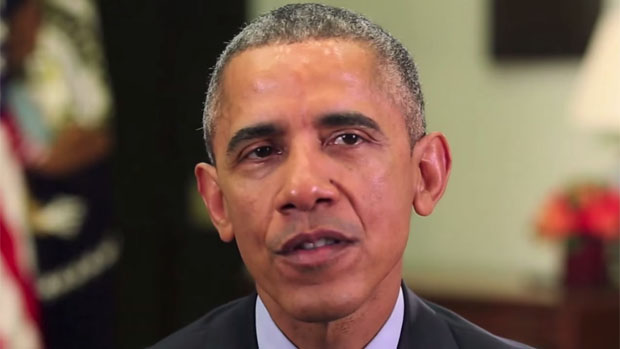Obama: Iran must scale down its nuclear activities
Talks between Iran and Western powers have made progress but 'gaps' remain, he warned

A free daily email with the biggest news stories of the day – and the best features from TheWeek.com
You are now subscribed
Your newsletter sign-up was successful
President Barack Obama has told the people of Iran that ongoing nuclear talks presented "the best opportunity in decades" for the two countries to transform their relationship.
"This moment may not come again soon," Obama said in his annual video message celebrating Nowruz, the Iranian New Year. "I believe that our nations have an historic opportunity to resolve this issue peacefully - an opportunity we should not miss."
He directly appealed to Iranians, urging them to put pressure on their leaders to accept the "reasonable" deal. "My message to you – the people of Iran – is that together we have to speak up for the future we seek," he said.
The Week
Escape your echo chamber. Get the facts behind the news, plus analysis from multiple perspectives.

Sign up for The Week's Free Newsletters
From our morning news briefing to a weekly Good News Newsletter, get the best of The Week delivered directly to your inbox.
From our morning news briefing to a weekly Good News Newsletter, get the best of The Week delivered directly to your inbox.
The long-running talks are aimed at limiting Iran's nuclear capabilities in return for a lifting of sanctions. Iran and six world powers – the US, the UK, France, Germany, China and Russia – are hoping to reach a framework agreement by March 31, with a final deal reached by July.
The complex agreement is likely to involve Iran scaling back its nuclear capabilities and agreeing to international inspections. In return, sanctions that have strangled its oil exports and hindered it economic developed would be lifted.
"The sticking points are thought to include the pace at which sanctions would be lifted, how long the deal will last and how much Iran's nuclear facilities will be open to inspection," the BBC reports.
Obama said Iran's leaders face a choice between continued isolation and sanctions or more trade and investment with the rest of the world. Securing a deal would mean a "path of greater opportunities for the Iranian people," he said.
A free daily email with the biggest news stories of the day – and the best features from TheWeek.com
The coming days and weeks "will be critical." While acknowledging that progress had been made, the president warned that gaps in the negotiations remained.
"There are people, in both our countries and beyond, who oppose a diplomatic resolution," he said. Obama faces stiff opposition to the deal from within Washington, with many lawmakers strongly opposed to the lifting of sanctions.
Earlier this month, a group of Republican senators warned Iran that any deal struck with the president could be revoked once he leaves office in 2017. The move was condemned by the White House as an attempt to undermine Obama's foreign policy.
-
 The Week Unwrapped: Have televised confessions quelled protests in Iran?
The Week Unwrapped: Have televised confessions quelled protests in Iran?Podcast Plus, why has Elon Musk turned from Mars to the Moon? And will the BBC prove to be a puzzles champ?
-
 The week’s best photos
The week’s best photosIn Pictures An Andean god, a rogue squirrel, and more
-
 9 products to jazz up your letters and cards
9 products to jazz up your letters and cardsThe Week Recommends Get the write stuff
-
 Epstein files topple law CEO, roil UK government
Epstein files topple law CEO, roil UK governmentSpeed Read Peter Mandelson, Britain’s former ambassador to the US, is caught up in the scandal
-
 Iran and US prepare to meet after skirmishes
Iran and US prepare to meet after skirmishesSpeed Read The incident comes amid heightened tensions in the Middle East
-
 Which way will Trump go on Iran?
Which way will Trump go on Iran?Today’s Big Question Diplomatic talks set to be held in Turkey on Friday, but failure to reach an agreement could have ‘terrible’ global ramifications
-
 Israel retrieves final hostage’s body from Gaza
Israel retrieves final hostage’s body from GazaSpeed Read The 24-year-old police officer was killed during the initial Hamas attack
-
 China’s Xi targets top general in growing purge
China’s Xi targets top general in growing purgeSpeed Read Zhang Youxia is being investigated over ‘grave violations’ of the law
-
 Panama and Canada are negotiating over a crucial copper mine
Panama and Canada are negotiating over a crucial copper mineIn the Spotlight Panama is set to make a final decision on the mine this summer
-
 Iran unleashes carnage on its own people
Iran unleashes carnage on its own peopleFeature Demonstrations began in late December as an economic protest
-
 How oil tankers have been weaponised
How oil tankers have been weaponisedThe Explainer The seizure of a Russian tanker in the Atlantic last week has drawn attention to the country’s clandestine shipping network